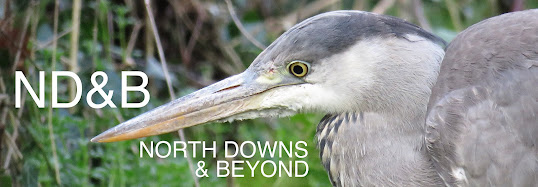Birds in a bush
I just love the photograph above. This morning, at Priest Hill, there was a bit of activity along the central path. Apart from a group of chats (5 Stone and 3 Whin) there were quite a few pipits zipping about. Up to 30 Meadows were hiding in the rank vegetation, popping up now and again to perch on the top of bushes. Their calls appeared to entice a few of their brethren down from above, including this bird that dropped like a stone into the middle of a bush, immediately followed by a Chiffchaff. I can only apologise that they were not a Tennessee Warbler and Olive-backed Pipit. At least two Tree Pipits were involved in this mornings movement, which is worth a double-celebration from me as I appear to be hearing this species calling once again - I had feared that they had dropped out of my aural register. Back at home a dribble of pipits, wagtails and finches accompanied a spot of gardening. I'm primed for a big movement - it's overdue.
As for the chats, there had been some turnover from yesterday, but whether or not a few - or all - had moved on, to be replaced by new birds, is impossible to tell. The only certainty is that one of the Whinchats was new in. This heavy passage of Stonechats has been replicated elsewhere, with counts of 50+ at Medmerry (West Sussex), 19 at Papercourt Meadows (Surrey), 29 at Richmond Park (Surrey) and 39 at Titchfield Haven (Hants). Most of these will be birds that have come from the breeding grounds of Ireland, western Scotland and NW England. Some will seek wintering quarters as far south as North African and Iberia, although many will establish winter territories in the southern half of England. Such high numbers surely point to an incredibly successful breeding season rather than a response to weather conditions.



Comments
As for hearing. Have you tried one of the many online hearing tests? It will give you an idea of where you stand or how old your ears might be.
Ric: Redwings, Swifts and Tree Pipits are lost at distance, although I can still register crests and reeling Grasshopper Warblers.